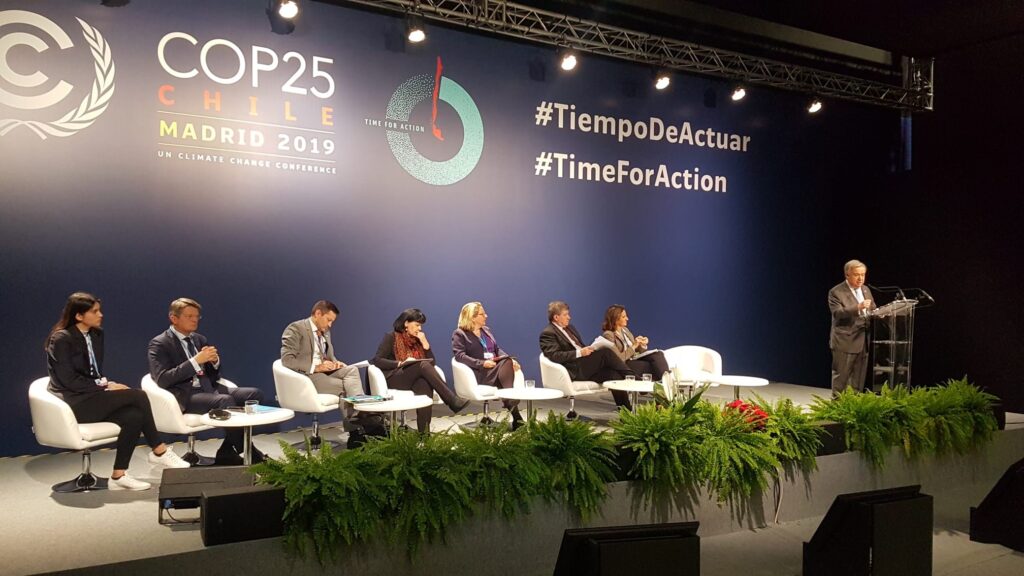12 December, 2019Regular update from COP25 by Brian Kohler, IndustriALL sustainability director.
An important event took place today: the launch of the “Climate Action for Jobs Initiative”.
As described by the ILO: “At the United Nations Climate Action Summit 2019 forty-five countries made commitments to place jobs at the heart of ambitious climate action. To turn this human-centred agenda into concrete action, United Nations Secretary General António Guterres announced a Climate Action for Jobs initiative. The UN Secretary-General identified the International Labour Organization (ILO) to spearhead the implementation of the initiative. Partners from governments, workers’ and employers’ organizations, international institutions and academia bring in their values, expertise and network under a common agenda.”
Read more about Climate Action for Jobs.
At the event, UN Secretary General António Guterres spoke of the urgency to act. We are losing the battle on climate change at the moment, but this can change if we work together. Climate Action for Jobs could change the conversation.
Guy Ryder, Director-General of the ILO, called on the Parties to integrate into the next round of Nationally Determined Contributions (NDCs) the Climate Action for Jobs strategy, Sustainable Development Goals and Just Transition. He stressed the need for a skills strategy and tripartite agreements. According to Guy, a sustainable future is within our reach, if we act with speed, determination cooperation and intelligence.
Teresa Ribera, Minister for Ecological Transition of Spain spoke on the example of the Spanish experience, particularly crafting a Just Transition approach for communities dependent on coal. The Spanish lesson can be replicated elsewhere. Forty-six countries have pledged to support the Climate Action Jobs Initiative, including a Just Transition, and we hope they will be joined by many others. We need to facilitate a genuine social dialogue including young people, workers, other civil society organizations.
In another example with lessons for the global community, German Environment Minister Svenja Schulze described the intense social dialogue that went into their plan to de-commission the use of coal in Germany. Germany aims to develop former coal-dependent regions into new hubs for renewable energy and green technology, with a Just Transition for workers and communities.
Artur Lorkowski, Climate Change Ambassador of the COP24 Presidency, referred to the Silesia Declaration framework for the discussion on Just Transition. More than fifty countries have subscribed to the Silesia Declaration. He pointed out that Just Transition is not only about costs, it is also about opportunities.
Sharan Burrow, General Secretary of ITUC stated that the world is in an age of anger, conflict, and displacement. Just Transition has a role to play across many of these convergent areas of crisis. However, Spain, Germany, Canada, and other countries are committing to Just Transition. We have to think about the intellectual property, we have to open source our technology. We need a new social contract that includes all of this. No-one can be left behind. Let’s implement the ILO centenary declaration, let’s have climate action for jobs; we have to act now, to guarantee labour the protection floor on rights, occupational health and safety, minimal wage, social protection, and a Just Transition for climate action. If governments refuse to listen to their people they will have to deal with people’s anger.
Roberto Suárez Santos, Secretary-General of the International Organization of Employers suggested that local employers have to get on board, and to build relationships with civil society. He emphasized the importance of new skills and re-skilling of workers.
Finally Barbara Neira, youth representative from Chile spoke about institutional injustice and the need to transform society.
The full texts of Guy Ryder’s and UN Secretary General António Guterres’ speeches.
In other news, as expected, there was some fallout from the protest yesterday. UN security were not amused; some of our members were de-badged. Civil society was chastised for not respecting the rules, stalling the COP process, and “compromising the safety of delegates”.
Bert De Wel responded on behalf of trade unions, that stopping Parties from entering the plenary for 10 minutes was hardly a cause of the failure of this COP. Rather, it is the inability of the Parties to deal seriously with the issues during the one-and-a-half weeks that the COP has already been meeting. In fact we are trying to help the COP Presidency get a decision by putting pressure on the Parties.
The situation shows the link between climate justice, and social justice. Of course COP25 is unique in that it is meeting in Spain after first Brazil, then Chile, refused to host it due to their right-wing views and their attempts to suppress civil society in their own countries.
Later today I learned that those who had their badges removed, would be re-admitted, and civil society groups would not be punished for the action.
Most of the publicly-open negotiations are finished; and now the success or failure of COP25 rests with the ministers. We need the references in the final text for equity, social justice, and Just Transition. Unfortunately, the ministerial talks are behind closed doors so it is difficult to be sure what is happening. The bits of news we receive are not encouraging, however.
Youth delegates are the real stars of this COP. Although Greta Thunberg gets most of the media attention, there is quite a large youth delegation here. All of those who I have met, have been most impressive. We have heard of the impact of the Chilean protests on youth, including at least one fatality of a teenager hit with a tear gas grenade. Chile’s youth have woken up – they will continue to fight alongside workers and others for better social conditions while protecting the climate. We have heard from a Quebecoise youth activist explaining why she got involved.
“Why should we go to school to get a job that has no meaning, if we have no confidence in the future? We are all together against the system that makes the poor poorer and the rich richer. We are at the beginning of a new era, we are asking for justice, and we will not be mocked.”
Worldwide, there is a growing anger awakening in young people. Their future is being stolen from them, and they are demanding that it be given back.
Indigenous peoples, women, environmental groups and trade unions too have called on the Parties to act decisively and make COP25 live up to its slogan: “time for action”. We shall soon learn if the leaders have listened.


